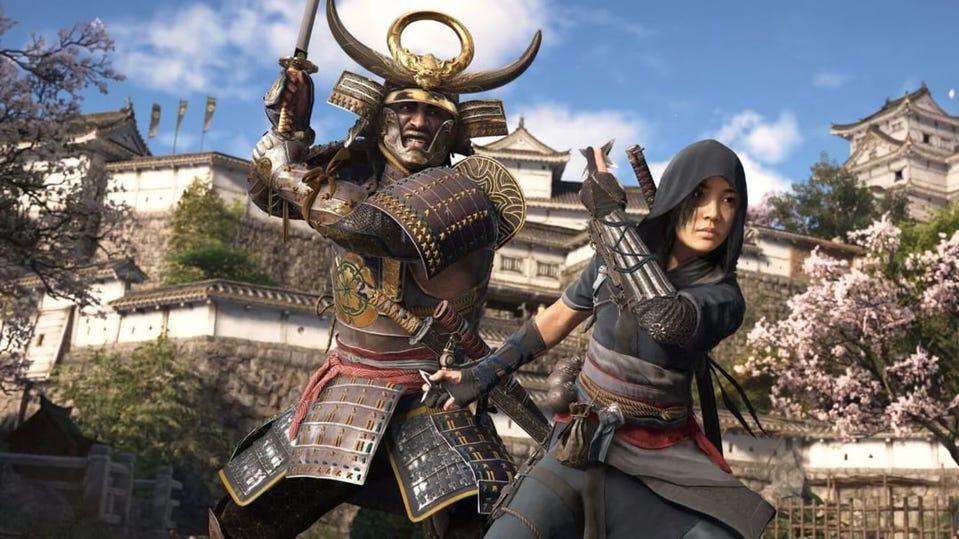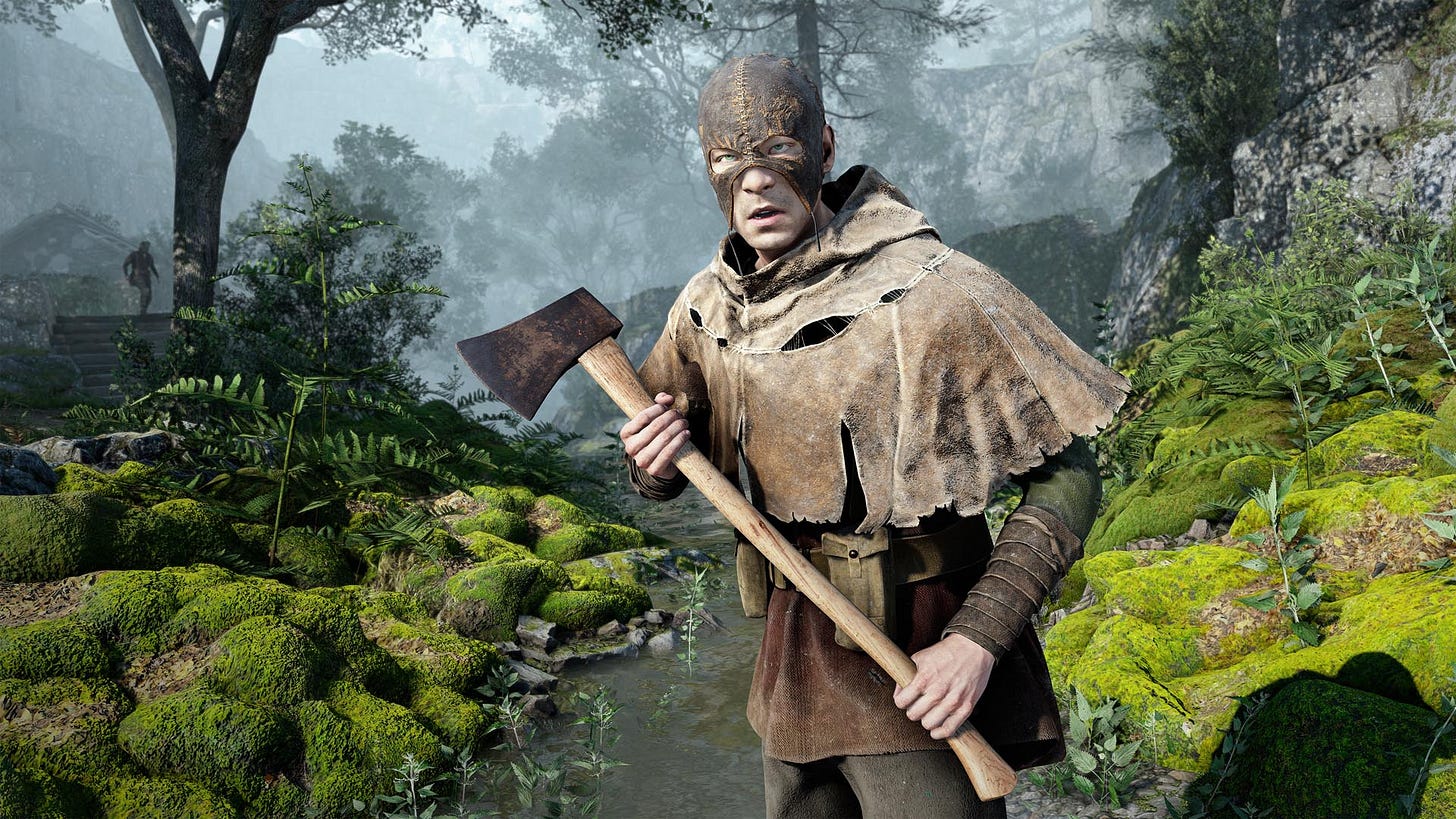This is how you win the (play) time war, 27/03/2025
Newzoo’s boffins share their thoughts on winning the battle for attention
Focus, audience alignment and expanding into new areas could be key to winning the play time wars, says Newzoo eggheads
Elon Musk gets bodied by Ubisoft’s official Assassin’s Creed X account
Atomfall provides a dystopian view of Britain in the week’s releases
| Find me on Linkedin | Follow me on Bluesky | Wishlist my book | Email me |
Hello VGIM-ers,
Another hearty welcome to you all from California.
I’ve spent the past seven days enjoying the sunshine, fresh air and riding around in magical robot cars with a sense of childlike wonderment.
Anyway, if you’re enjoying my work and want to receive more of it, make sure to sign up as a paid VGIM Insider before tomorrow’s Debrief drops into inboxes.
As well as receiving the monthly round-up of all things games and another extra newsletter every month, you’ll also receive early access to tickets to every VGIM event, special offers from VGIM partners and 10% off all VGIM sponsorships and advertising packages while you’re an Insider.
You can sign up by hitting the button below.
And with all that self-promotion done, could I bother you for a moment of your time, please?
The big read - This is how you win the (play) time war
Time is money: The biggest battle in games today isn’t over money; it’s over time. After years of seemingly limitless growth in how long people play for, the industry is waking up to the cold reality that time is as disappointingly finite in video games as it is in the rest of our existence.
Attention seekers: Market data firm Newzoo got this point across effectively last year. In April 2024, it published a report which revealed that 27% of playtime on console and PC was hoovered up by five titles that were each more than seven years old - forcing everyone else to fight for the crusts of the playtime pie in the manner of hungry children.
Chit chat: But how has the fight for those crusts of delicious time changed over the past year? Is there much of a difference in the time war on PC and consoles? And what can game developers do to win the fight for attention? I was given an exclusive sneak peek of the findings of this year’s report, which is due out in a couple of weeks, so that I could prod Ben Porter, Consulting Director at Newzoo, and Michiel Buijsman, the company’s Principal Games Market Analyst, for answers.
Pressed for time
Slowing for growth: Let’s get the bad news out of the way first. In stark contrast to former musician and noted science man Brian Cox, things aren’t going to get better for the games companies crossing their fingers for rapid growth. “I think it is fair to say that the games industry is growing slowly, let’s say in modest single-digit numbers from a revenue perspective as well as a player perspective,” said Ben, in the manner of a friendly doctor breaking the news that your rash isn’t going to clear up anytime soon.
Paper trails: On paper, and tasty chart form, such a growth rate doesn’t look too bad. Newzoo forecasts that the combined PC and Console market will generate revenues of $92.7bn in 2027 (up from $80.2bn in 2024) by reaching 1.67bn players across the world. That’s up from $80.2bn in revenue in 2024 and a frankly paltry 1.53bn players on both platforms. Ha!
Unevenly rising tide: But once reality starts to intrude on the paper picture, things look a little different. After you crack the console and PC data points apart from one another, it becomes obvious that the industry’s gentle upward push in the next few years will be disproportionately made on the near-Sisyphean shoulders of Grand Theft Auto VI and the Switch 2. And once you whip those whoppers out of the data, you’ve got yourself a market flatter than a British-made pancake.
PC gone mad: This is particularly true for our friends developing games on PC. To provide more depth on last year’s headline-grabbing data point, Newzoo’s boffins have separated playtime habits on PC and console. By doing so, they discovered that 67% of PC playtime went to games that were more than six years old and to just 8% of games released in 2024. In comparison, 44% of play on PlayStation in 2024 went to long-in-the-tooth titles while 15% went to games released last year. Yikes.
Fight, fight, fight: But even with PC game developers facing a particularly challenging scrap for people’s attention, Newzoo’s report makes it painfully clear that everyone in both markets will have to scrap with one another wildly to secure precious player attention.
Carving out a niche: “The battle for players is going to be fierce.” Ben explained. “When you launch a new game, you don’t have new games meeting new players. You have new games carving out players from existing games.” And this means we’re all going to have to think a little differently about how we grab people’s attention as a result.
User-generated contentment?
UGC-ing more of this: So what exactly can developers be doing differently to cut through in the market? The most provocative thought I had while reading the report is that game developers probably need to start thinking about ways to bring their intellectual property (IP) to user-generated content (UGC) universes like Roblox and Fortnite if they want to snaffle much-needed player attention.
Big Techification of games?: When I read Newzoo’s report last year, I feared that the steady growth of the UGC platforms - and their increasingly whopping content-powered network-effect driven ecosystems - could spell doom for wider playtime in the industry. But there was a data point in this year’s report which suggested I might have been wrong about this (as, to be fair, I usually am).
Added value: In its analysis of playtime data within the PlayStation ecosystem, Newzoo discovered that the release of Roblox, Lego Fortnite and Fortnite OG in late 2023 had an additive effect on playtime of 20% on the platform. And while each of these games sucked up the majority of this extra time for themselves, the rotters, they did also increase playtime within the PlayStation ecosystem overall. This suggests a cross-pollination effect that contrasts with other big releases like Call of Duty: Black Ops 6, which, according to the data, chewed up more playtime than it gave back when it launched last year.
Question marks: So, how exactly can developers take advantage of this fascination in the passageway between UGC platforms and games? The answer at the moment is “dunno mate”. Ben told me that “it’s incredibly unclear how a Roblox experience translates into video game sales”, suggesting that there’s currently a massive knowledge gap over whether UGC experiences can make money for games businesses via cross-promotion or within UGC economies directly.
Transmedia for the wins: However, the wild success of the Sonic the Hedgehog Speed Simulator experience in Roblox, which racked up 70m plays in its first week of existence, suggests that something is brewing in the UGC universe for games companies at large. And while dabbling in it is not going to be smart for all game businesses (for the love of God, we don’t need a Disco Elysium Roblox experience), Ben suggested that companies with some IP pulling power could potentially use it as part of a transmedia marketing strategy.
Intellectual properly: “You either need an existing IP from somewhere else and bring it to gaming, or you take an existing IP from gaming and put it somewhere else,” Ben posited. “But in these circumstances, it does make sense that if you have a compelling IP that it could go into a place like that [a UGC platform].”
Audience expectations
Laser focus: So, leaning into UGC is a potentially great way to keep players spending time with your game’s IP - even when they’re not playing your game itself. But what can you do if your game company doesn’t happen to possess a prime bit of video games creative real estate or a digital marketing budget big enough to eff around and find out with? The answer, which will be of no surprise to regular readers of this newsletter, is establishing a laser-like focus on pitching the right game to the right audience.
Look away now, Bioware: As Ben told me, the big issue in the video games industry at the moment isn’t a lack of great releases; it’s players having way too much of a good thing to benchmark against. “I hate punching down on games like Dragon Age: The Veilguard [an RPG that underperformed expectations in 2024], but in a market where you can put 250 hours into Baldur’s Gate 3 and there’s a backlog of Divinity Games to work through, Dragon Age has to put its best foot forward rather than be a seven out of ten game,” Ben said. “Otherwise, people are just not going to put their time and money into that, right?”
Dissing the games I play: Having bought and played the whole of Dragon Age: The Veilguard like the idiot I am, I agree with Ben. So, how exactly can developers get that focus?
Horrible advice: The first tip, which Ben acknowledged is partly “horrible advice”, is for studios to build their games businesses upon genres, games or a thesis that a developer is happy to spend years (if not decades) refining. The success of From Software and Larian Studios may have felt ‘overnight’ with the launches of Elden Ring and Baldur’s Gate 3. But the reality is that both companies had developed great games within their chosen oeuvre for decades - giving them the expertise and the opportunity to release the kind of ‘best in class’ experience that turns on the money hose.
Targeting time: But for those of us without twenty years to steadily work on building a games business, Michiel’s big tip for winning the time war is to stop marketing games towards personas and to instead define much more clearly who exactly your audience is (and how that affects the way they both pay and play for games).
Olden times: “During GDC week, we spoke to our publishing clients who have been around games for a while, and what you’re seeing is that they have more separate segments for players,” Michiel said. “Like they have segments for players who are older and are willing to spend more money on games, but they want shorter experiences that fit into their lives. So they are focusing on these demographics to make games for, rather than trying to be the next mass market thing.”
To the point: In short, and returning to Ben’s point of view for a second, this means that “you have to know who you’re making a game for and whether its audience exists.” Therefore businesses who do develop a clear market thesis around the games they’re making, align it to genuine consumer needs - e.g. couples who want couch co-op games for date night, Dads who love grand strategy games but have two hours a week to play - and can right-size the market to set a sensible budget for their game will be in prime position to flog to consumers (and, handily, score some of that sweet, sweet publishing wonga).
Projecting success
Equal access: And finally, developers can find ways to carve out more time for their games amongst consumers by ensuring that distribution and access to them is as seamless as possible across the devices players want to play on.
Barrier to entry: The rationale behind this one is actually pretty simple: games are, for once, the negative outlier in the creative industries when it comes to digital content access. Despite advancements in the past decade, the majority of games released retain at least some barrier to entry to players due to exclusivity deals, the device someone has to play on or the nature of the platform they install games on (curses to you too, Big Tech!) This means that access to games is anachronistic to modern consumers, who’ve grown up with (or grown accustomed to) creative content being readily available on whatever device they want it on.
Projecting power: For game developers who aren’t working on a hardware-specific game (e.g. a VR title or something on PlayDate), expanding reach pretty much boils down to choosing between one of two options: going cross-platform or engaging in what Ben described as ‘cross projection.’
Crossing the streams: Most readers of this newsletter would make the reasonable assumption that a truly cross-platform experience would be the best thing to aim for. After all, if you can unify a player base across devices - especially for a multiplayer live service title - then you’re delivering that Netflix or Spotify style seamless content access dream to players.
Getting a handheld on things: However, cross projection may be a more enticing option for most developers specialising in console and PC. Rather than going all in on a truly cross platform experience - and bumping into the costly frictions of device and platform optimisation on, say, mobile phone touch screens - cross-projection encourages developers to build a light digital infrastructure layer above the device (e.g. cloud save progression systems) and then target their porting work at a handful of relevant devices (e.g. Switch 2 and Steam Deck) to project their game a little further than it would otherwise go.
Dissing mobile Triple A ports: For Ben, gunning for “cross-projection” is handy for developers trying to achieve the right balance between expanding reach without compromising a game’s experience. “Do I want to be able to pick up my God of War game, whether it’s on my Steam deck, my PC or my PlayStation? Yeah, absolutely because those are the appropriate platforms to be playing and engaging with those types of games,” he said. “Do I want to pick up God of War on my phone? Maybe in an hour of desperation. But for me personally? No, not really.”
Too much of a good thing: And while Ben was willing to accept that some might want to slay Thor on a smartphone screen (good luck to those perverts), I think his comment here is illustrative of the much wider point that Newzoo is making. The issue in the market today isn’t that players aren’t wanting to engage with great video games; it’s that a maturing audience for games has far too many to choose from at a point in their lives when their free time is narrowing - making them much pickier in regards to which games they spend their time and cash with.
Three steps to glory: So if you don’t happen to have the benefits of a massive entrenched community, a world-beating IP and a big enough development team to stomp all over the market, Newzoo’s advice for winning the time war is simple. Give your business focus, target your games at a tightly defined audience and strategically expand access to your game (or game IP) on devices and platforms that align with what your audience wants.
Easy does it: And if you get those three things right, there’s a chance that you’ll emerge from the battle for time bloodied but successful. Piece of cake, right?
Want to read Newzoo’s report in full without enduring numerous glib asides along the way? Pre-register your interest in receiving its PC and Console Gaming Report, which is out on Tuesday 8th April, on the company’s website here.
News in brief
Character Assassination: Elon Musk has been publicly dissed by a Ubisoft social media account in a manner that, frankly, we love to see. The ‘Roman” saluting former car salesperson posted a tweet claiming that political commentator and game streamer Hasan Piker was playing Assassin’s Creed: Shadows on his stream because “he is promoting a terrible game just for the money.” The Assassin’s Creed official social media account responded to Musk’s post with the response, “Is that what the guy playing your Path of Exile 2 account told you?” Zing.
Not horsing about: The European Commission’s Consumer Protection Cooperation Network (CPC) has launched an enforcement action against Star Stable Entertainment following accusations that it is engaging in practices that violate EU consumer protection rules against kids. The enforcement action has grabbed the headlines because who doesn’t love it when the blue lights are flashing? But the devil of this story is in the details of the best practice principles that the CPC somewhat ironically tucked away in a PDF, which could force game developers to display cash conversions for all their in-game purchases to European consumers in the future. Uh-oh…
Savvy moves: Bloomberg reports that the leadership of Savvy Games Group is considering shifting its investment focus towards PC games. The Saudi-backed games publisher has made significant moves towards dominating the mobile games ecosystem via its ownership of Scopely and Niantic, but is looking to expand its horizons into other parts of the sector. A deal with CD Projekt Red to work on an as-yet-unrevealed development project is one of those manoeuvres.
Nicht gut: Germany’s video games market has dropped in value by 6% to €9.4bn, according to figures released by the German video game trade association GAME. A combination of tumbling console hardware sales and a decline in spend on games as a result of 2024’s quiet release slate has left the German games industry on Cloud Nein (stop booing at the back).
Lazarus in action: Consumer games outlet Game Informer has returned to life after being rescued by Gunzilla Games. The outlet will offer consumers digital content and a print magazine, supported by subscriptions. It also means that it will resume publishing its game release calendar, something which has been dearly missed by someone who often rounds up the video games that are coming out this week. Coughs.
Moving on
Chris Dring has kicked off new trade media outlet The Games Business with support from Geoff Keighley…Carlos Figueiredo is the new Director, Trust & Safety (Minecraft) at Microsoft…Kiera Beasley has popped up as the Team Administrative Officer at Ukie…Damon Marshall has been appointed SVP, Mobile Growth and Partnerships at Xsolla…And Sensible Soccer legend Jon Hare has been named the head of Sporty Group’s new UK-based game development studio…
Jobs ahoy
The plum role of EMEA Communications Director for Activision Blizzard is currently open…Oh, and speaking of Activision Blizzard again, it also needs an Expert Level Designer - Single Player in Surrey…Arm is recruiting a Senior Game Engine Developer in Cambridge…TikTok is seeking a Gaming Creator Growth Manager for its Live product over in Los Angeles…And Games Workshop is hunting for an Event Manager to grow its presence in North America…
Events and conferences
Games Industry Law Summit On Tour, Rome - 1st-3rd April
London Games Festival, London - 2nd- 13th April
BAFTA Game Awards, London - 8th April
Reboot Develop Blue, Dubrovnik - 14th-16th April
A.MAZE, Berlin - 14th-17th May
Games of the week
Atomfall - British-made (and set) spin on RPGs a la Fallout arrives across platforms this week.
The First Berserker of Khazan - It describes itself as “a hardcore action roleplaying game.” Reviewers call it a pretty decent Souls-like, if you’re interested.
Dollhouse: Behind the Broken Mirror - Terrifying first person horror game, is it? Probably one for me to pass then…
Before you go…
On the one hand, some people tell me that Saudi Arabia’s interest in the games industry is purely economic and not related to a wider ‘culturewashing’ agenda seen in its investment in the sports industry.
On the other hand, Cristiano Ronaldo, the aged granite carved footballer who currently plies his trade for Saudi Arabian team Al Nassr, has been included as a character in Fatal Fury: City of the Wolves - a fighting game published by SNK, the game developer owned almost entirely by a subsidiary of the Muhammed bin Salman Foundation.
Who’s to say which side is right in this argument?








Ubisoft sucks, Assassin's Creed: Destroy Japanese Culture sucks.